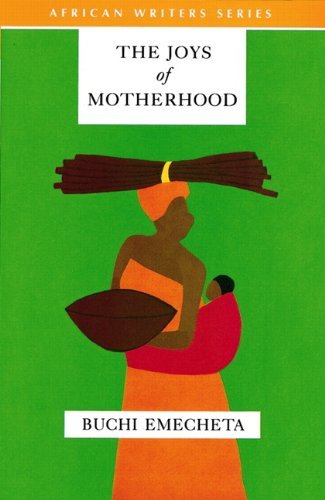Nnu Ego is the daughter of a proud chief of Ibuza and the one woman who refused to become one of his many wives. Raised up as the apple of her father's eye and the last remnant of the mother who died birthing her, Nnu Ego has high expectations for her life. She wants, as her community says, to "become a woman" -- to get married and have children. Her first marriage is a disaster; her second, considered a victory because of the children she's blessed with. Her relationship with her husband, a city man in Lagos, is fraught with difficulties, and although Nnu Ego is convinced that her life will become better once she has a child, preferably a son, it soon seems to her that the joys of motherhood are overrated -- not to mention few and far in-between.
A poignantly reflective novel that seeks to unravel the complicated relationship women have with motherhood, Emecheta's The Joys of Motherhood, published in 1979, is an excellent glimpse into the early burgeoning of black, and specifically African and Nigerian, feminism. Our heroine, Nnu Ego, is at odds with the new way of living emerging in Nigeria. Growing up in a village, she is used to farming, to hardworking men and women and the traditional roles that go alongside this lifestyle. When she arrives in Lagos, keen to meet the new husband that will hopefully fulfill her desire to have children, it's a true and thorough culture shock. Here, in the big city, her husband does something that, in Nnu Ego's eyes, is totally against all of the gender norms of masculinity she's grown up with: he washes and launders his white employers' clothes.
These are just a few of the ways that gender norms are expressed in Emecheta's writing. Most of it focuses on Nnu Ego's expectations of herself, and other women: you don't "become a woman" until you have a husband and until you have a child. Until that happens, you live a half-life, waiting to become fully human. Emecheta compares motherhood and womanhood to slavery over the course of the novel; at one point, Nnu Ego thinks of her children as the chains of her slavery, her husband Nnaife knowing that as long as her children with him live, she is bound to him forever, that she is unable to leave them.
It must be said that this novel is crushing in its bleakness. Time and time again there is subtle hope that Nnu Ego will break free from the cyclical nature of the life she's living, or perhaps that someone else in the novel will, but despair is the most constant emotion that permeates The Joys of Motherhood. Its ending, in particular, is devastating -- however naively, I kept thinking that something had to give. However, I'm so glad that I chose to read this, as it's a truly insightful, deep, and complex narrative that will stick with you long after you've finished the last page.
Highly recommended, and unmissable if you're interested in African feminism.

